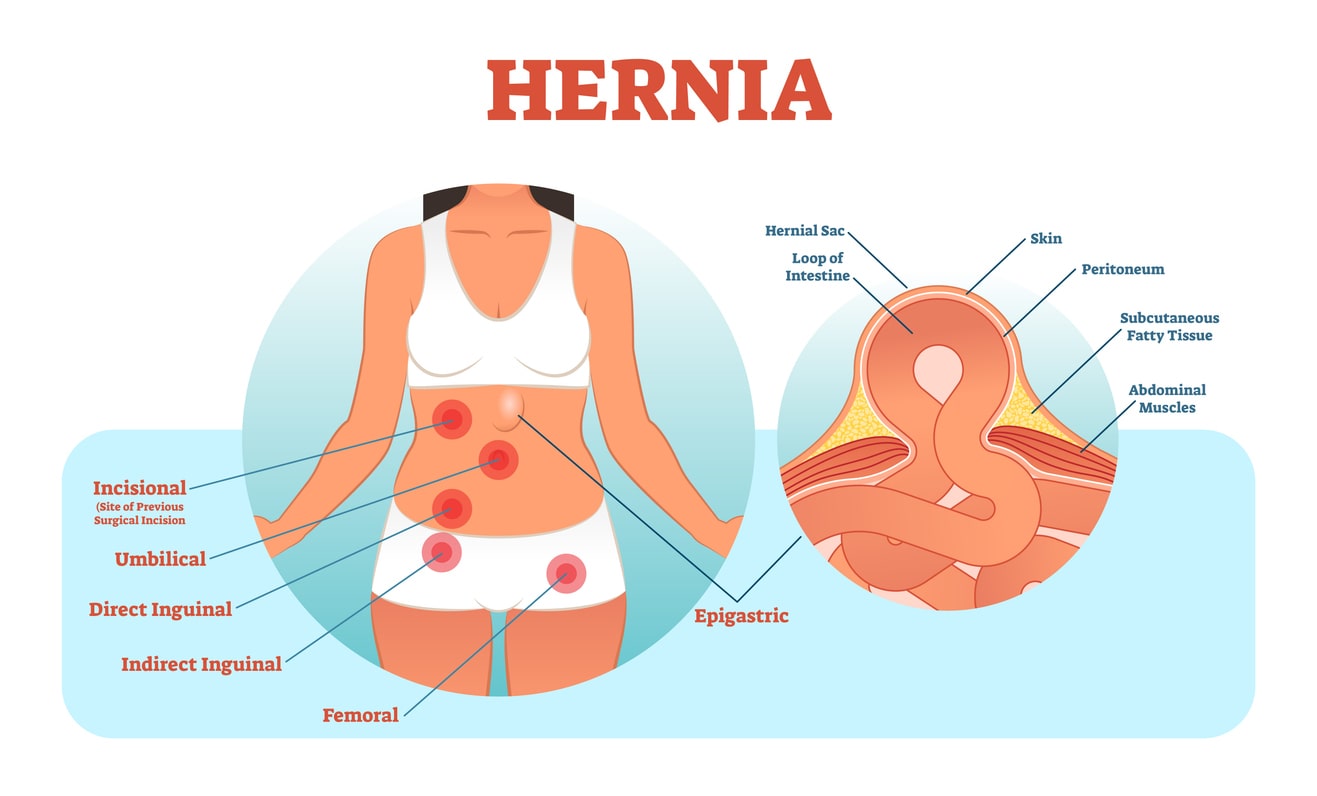
Why Hernias Happen and How to Treat Them Safely
Hernias are a common health issue. They happen when an organ or tissue pushes through a weak spot in the muscle or connective tissue. They may not be life-threatening at first, but still, they can cause a lot of discomfort and require medical care. Knowing why hernias occur and how to treat them can help you avoid problems and boost recovery.

Types of Hernias
Hernias can occur in various areas of the body, each with unique causes and characteristics. Some of the most common types of hernias include:
- Inguinal Hernia: The most common type occurs in the groin area when a part of the intestine or bladder pushes through the abdominal wall.
- Hiatal Hernia: Occurs when part of the stomach pushes up through the diaphragm into the chest cavity, often causing heartburn or acid reflux.
- Umbilical Hernia: Common in infants, this type happens when part of the intestine or fatty tissue bulges through the belly button area.
- Incisional Hernia: This occurs when tissue pushes through a scar from a previous surgery, most often in the abdominal area.
- Femoral Hernia: This occurs when tissue pushes through the femoral canal, which is located near the groin and is more common in women.
What Causes a Hernia?
Hernias can occur in various areas of the body, most commonly in the abdomen. Some key factors that contribute to the development of hernias include:
- Weakness in the Abdominal Wall: The most common cause of hernias is weakness in the abdominal wall muscles. This weakness can be present at birth or develop over time due to factors like aging or previous surgeries.
- Increased Pressure: Activities or conditions that put increased pressure on the abdominal wall can lead to hernias. This can include heavy lifting, chronic coughing, straining during bowel movements, or obesity. The added pressure can force an organ or tissue through the weak area.
- Genetic Factors: Some people are born with a genetic predisposition to hernias, meaning their abdominal walls may be naturally weaker. Family history can also increase the risk.
- Previous Surgery: Surgery can weaken the surrounding tissue, leading to an increased risk of hernias. Incisions made during abdominal surgery can create weak spots in the muscle or tissue, making it easier for hernias to develop.
- Chronic Health Conditions: Certain conditions, such as chronic obstructive pulmonary disease (COPD) or cystic fibrosis, that lead to frequent coughing or respiratory stress can increase the likelihood of developing a hernia due to the ongoing strain on the abdominal wall.

Risk Factors
Several factors can increase the risk of developing a hernia. Age is a major factor, as abdominal muscles weaken over time, especially in older adults. Gender also plays a role—men are more likely to have inguinal hernias, while women tend to get femoral hernias. Obesity adds pressure on the abdominal wall, increasing the chances of a hernia, and pregnancy can raise the risk, especially with umbilical and inguinal hernias.
Family history matters too, as some people inherit weaker abdominal muscles. Chronic health issues, like persistent coughing or constipation, can also contribute to hernia development.
Symptoms of Hernias
Hernias often present with noticeable symptoms, but they may develop gradually or remain subtle in some cases. Here are some common signs that could indicate the presence of a hernia:
- Visible Bulge: A noticeable lump or bulge under the skin, especially when coughing, bending, or lifting. This may disappear when lying down.
- Pain or Discomfort: Pain or tenderness at the site of the bulge, which can worsen with physical activity or straining during bowel movements.
- Pressure or Fullness: A sensation of pressure or fullness, particularly in the abdomen or groin, that can increase with physical activity.
- Nausea or Vomiting: If the hernia causes a blockage or strangulation, it may lead to nausea or vomiting, which requires immediate medical attention.
- Heartburn or Acid Reflux: A hiatal hernia may cause acid reflux, leading to heartburn, difficulty swallowing, or regurgitation of food.
How to Treat Hernias Safely
While not all hernias require surgery, talking with your doctor to determine the best course of action is necessary. Here are some common treatment options:
Watchful Waiting
If your hernia is small and not causing discomfort, your doctor may recommend a “watch and wait” approach. This involves monitoring the hernia for any changes while avoiding activities that put excessive pressure on the abdominal area. If the hernia begins to cause pain or other complications, more active treatment will be required.
Lifestyle Modifications
Maintaining a healthy weight, avoiding heavy lifting without proper technique, treating chronic coughing, and eating a high-fiber diet can all help reduce pressure on the abdomen and prevent strain, which may exacerbate or contribute to hernias.
Surgical Repair (Herniorrhaphy)
Surgery is often the most effective treatment for hernias, especially if they are painful or have a risk of complications like strangulation (when the blood supply to the herniated tissue is cut off). Surgical options include:
- Open Surgery: The surgeon makes an incision near the hernia and pushes the protruding tissue back into place before reinforcing the area with stitches or mesh.
- Laparoscopic Surgery: A minimally invasive technique where small incisions are made, and the hernia is repaired using a camera and specialized tools. This method usually leads to quicker recovery times and less scarring.

Can Hernias be Prevented?
While hernias can’t always be fully prevented, some lifestyle changes can help lower the risk. Maintaining a healthy weight is key, as extra weight adds pressure to the abdomen and increases the chances of developing a hernia. Avoiding heavy lifting is also important; if lifting is necessary, using proper technique helps reduce abdominal pressure. Treating chronic conditions like coughing, asthma, or allergies can further minimize the risk by easing the strain on the abdomen. A high-fiber diet can prevent constipation, which reduces the risk of straining during bowel movements. While these steps can lower the chances of a hernia, they can’t guarantee prevention, especially for those with genetic risks or other uncontrollable factors.
Contact Us
Hernias may be prevented with lifestyle changes, but if you’re experiencing symptoms, it’s important to seek care. Early intervention can prevent complications and help manage the condition effectively. If you’re concerned about a hernia, our team at Gastroenterology of Greater Orlando is here to help. Contact us today to schedule an appointment and take proactive steps toward better digestive health.